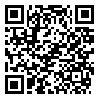Volume 16, Issue 38 (2-2021)
goljaam 2021, 16(38): 31-45 |
Back to browse issues page
1- Graduated from Isfahan Art University
2- Faculty Member of Carpet Department in Isfahan Art University
2- Faculty Member of Carpet Department in Isfahan Art University
Abstract: (3281 Views)
The art of weaving in the territory of Iran is a part of the cultural identity of it`s people. The traditional handicrafts of Sistan and Baluchestan are also considered as an important aspect of this identity. Apart from design and color, many other dimensions of carpet production in this region can be considered as their cultural-religious characteristics. Since the study of the semantic dimensions of an artwork in terms of its creator is much more recognizable,
the present study aims to identify the unknown aspects of the indigenous culture and beliefs of the producers of these crafts by visiting the case study, and it also tries to answer this question that what is the correlation between indigenous rugs of Sistan and Baluchestan and their creators’ cultural traits and religious values.
This research has conducted direct observation and interviews with the natives with the approach of art anthropology and the methodology of ethnography in the region, and then through data coding in three levels of open, axial, and selective coding has attempted to classify them.
The results show that elements comprising the carpets in the Sistan and Baluchestan region, from their initial stages to the end, have wide semantic dimensions so that even the most trivial of them have deep roots in the culture and beliefs of its natives. Specific rituals for weaving, belief in sore eyes, composing special poems during weaving, washing ceremonies, etc. are a part of this elements. In this province, apart from its practical aspects, carpet is considered as a sacred commodity, and although there are obvious cultural differences among the people of Sistan and Baluchestan, the similarity of some beliefs regarding carpets shows the unity of the primitive roots of carpet weaving among the two main groups of inhabitants in this region.
the present study aims to identify the unknown aspects of the indigenous culture and beliefs of the producers of these crafts by visiting the case study, and it also tries to answer this question that what is the correlation between indigenous rugs of Sistan and Baluchestan and their creators’ cultural traits and religious values.
This research has conducted direct observation and interviews with the natives with the approach of art anthropology and the methodology of ethnography in the region, and then through data coding in three levels of open, axial, and selective coding has attempted to classify them.
The results show that elements comprising the carpets in the Sistan and Baluchestan region, from their initial stages to the end, have wide semantic dimensions so that even the most trivial of them have deep roots in the culture and beliefs of its natives. Specific rituals for weaving, belief in sore eyes, composing special poems during weaving, washing ceremonies, etc. are a part of this elements. In this province, apart from its practical aspects, carpet is considered as a sacred commodity, and although there are obvious cultural differences among the people of Sistan and Baluchestan, the similarity of some beliefs regarding carpets shows the unity of the primitive roots of carpet weaving among the two main groups of inhabitants in this region.
Article number: 4
Type of Study: Research |
Received: 2019/12/1 | Accepted: 2022/02/8 | Published: 2022/03/14
Received: 2019/12/1 | Accepted: 2022/02/8 | Published: 2022/03/14
| Rights and permissions | |
 |
This work is licensed under a Creative Commons Attribution-NonCommercial 4.0 International License. |



